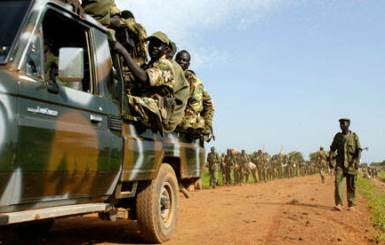Abyei community warns of consequences of ignoring conflict
April 13, 2014 (JUBA) – Leaders from the contested oil-producing region of Abyei have warned the international community of the consequences of ignoring the ongoing conflict.

He said the area had a special connection for many people as it was the final resting place of family members.
“Our people feel that the memories of the international community are shortening and quickly losing focus on the cause of the suffering of the people of Abyei,” he added.
However, Kuol said many people in the north held fears for their safety due to the threat of militia groups aligned with the Sudanese government.
The traditional leader has expressed deep concerns over the worsening security situation in the area, saying the conflict continued to place pressure on local resources, particularly grazing and water point areas.
The situation has also been further compounded by violent conflict in South Sudan, which erupted in mid-December last year amid worsening political tensions.
The Arab Misseriya nomads, who typically travel to areas in South Sudan’s Unity and Upper Nile states at this time of year, have been unable to do so as a result of the current situation, and are instead attempting to access water and grazing areas in Abyei’s south, leading to tensions with the Ngok Dinka, who considers themselves the rightful owners of the area.
“These militias are in the north of the area. They are the ones which together with elements from [the] Misseriya [tribe] and Sudan Armed Forces carried out the attacks in February and March,” Kuol said.
“They (the Misseriya) want to go south of Abyei, but people in these areas said certain arrangements must be met. They (the Ngok Dinka) are saying they should not go to their areas with guns, which they (the Misseriya) are not accepting and they want to force their way,” he added.
Fierce clashes between the Misseriya and Ngok Dinka tribes have erupted in the past month, claiming the lives of an unconfirmed number of people and causing displacement.
The Abyei territory is claimed by both Sudan and South Sudan, with the latter breaking away from the former in July 2011, leaving several unresolved post-secession issues.
In 2012, the African Union mediation team proposed holding a referendum in Abyei, stipulating that only those residing permanently in the area would be allowed to vote in the plebiscite and decide whether they want to join Sudan or South Sudan.
The Sudanese government, however, rejected the AU proposal aimed at breaking the deadlock, saying it ignored the eligibility of the Misseriya, who enter the area periodically to graze their cattle.
DARK DAYS AHEAD
General Kuol Monyluak, head of the South Sudan supported local administration, confirmed that people in the extreme north of Abyei are afraid to leave, but are determined to return if the security situation improves.
“Our people are determined to return to their areas for cultivation but the current security situation is becoming an immediate concern,” Monyluak said on Sunday.
He warned of “dark days” ahead unless the international community steps in to find a speedy resolution to the conflict over the ownership of the area.
“There are clear indications of the dark days coming ahead. There is no food to the people returning to areas north of Abyei and the issue of security is becoming a big concern. These are very big issues of concerns to us as the authorities and feel it is time the international community should [take] decisive action,” Monyluak said.
“The two presidents [of Sudan and South Sudan] would never agree. They have already failed to reach an agreement on the way forward,” he added.
(ST)
